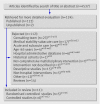Effectiveness of acute geriatric units on functional decline, living at home, and case fatality among older patients admitted to hospital for acute medical disorders: meta-analysis
- PMID: 19164393
- PMCID: PMC2769066
- DOI: 10.1136/bmj.b50
Effectiveness of acute geriatric units on functional decline, living at home, and case fatality among older patients admitted to hospital for acute medical disorders: meta-analysis
Abstract
Objective: To assess the effectiveness of acute geriatric units compared with conventional care units in adults aged 65 or more admitted to hospital for acute medical disorders.
Design: Systematic review and meta-analysis.
Data sources: Medline, Embase, and the Cochrane Library up to 31 August 2008, and references from published literature. Review methods Randomised trials, non-randomised trials, and case-control studies were included. Exclusions were studies based on administrative databases, those that assessed care for a single disorder, those that evaluated acute and subacute care units, and those in which patients were admitted to the acute geriatric unit after three or more days of being admitted to hospital. Two investigators independently selected the studies and extracted the data.
Results: 11 studies were included of which five were randomised trials, four non-randomised trials, and two case-control studies. The randomised trials showed that compared with older people admitted to conventional care units those admitted to acute geriatric units had a lower risk of functional decline at discharge (combined odds ratio 0.82, 95% confidence interval 0.68 to 0.99) and were more likely to live at home after discharge (1.30, 1.11 to 1.52), with no differences in case fatality (0.83, 0.60 to 1.14). The global analysis of all studies, including non-randomised trials, showed similar results.
Conclusions: Care of people aged 65 or more with acute medical disorders in acute geriatric units produces a functional benefit compared with conventional hospital care, and increases the likelihood of living at home after discharge.
Conflict of interest statement
Competing interests: None declared.
Figures




References
-
- Calkins E, Naughton BJ. Care of older people in the hospital. In: Calkins E, Boult C, Wagner EH, Pacala JT, eds. New ways to care for older people. Building systems based on evidence. New York: Springer, 1998:99-111.
-
- Ellis G, Langhorne P. Comprehensive geriatric assessment for older hospital patients. Br Med Bull 2005;71:45-9. - PubMed
-
- Parker SG, Fadayevatan R, Lee SD. Acute hospital care for frail older people. Age Ageing 2006;35:551-2. - PubMed
-
- Palmer RM, Counsell SR, Landefeld SC. Acute care for elders units. Practical considerations for optimizing health outcomes. Dis Manage Health Outcomes 2003;11:507-17.
-
- Gray L. Geriatric consultation: is there a future? Age Ageing 2007;36:1-2. - PubMed
Publication types
MeSH terms
LinkOut - more resources
Full Text Sources
